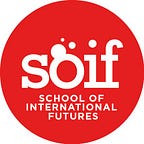Next Generation Foresight Practitioners at MEI Futures Forum
Written by Steven Kenney
As the Director of the Strategic Foresight Initiative (SFI) at the Middle East Institute (MEI), it was exciting to convene recently our first annual “Futures Forum.” One reason was the high level of interest both from very distinguished speakers and from a global audience — attention to futures work is surging at an important time. Another reason was my opportunity to host a panel with three members of the SOIF Next Generation Foresight Practitioners (NGFP) community.
Our aim in the panel was to showcase the exceptional work of Raya Bidshahri, Moutaz Al-Riyami, and Elias Mouwad as demonstrations of what drives the SFI. That driver is the idea that futures work has measurable, practical impact, shaping decisions and actions of leaders today to create positive futures that might not be attainable without this work.
Four themes emerged on ways in which strategic foresight is making a difference in the MENA region, and the world. All are powerfully exemplified by Elias, Moutaz, and Raya’s work.
1.Overturning assumptions to envision futures unrestricted by the present
It’s common and easy to get hung up on how a transformed future “couldn’t” happen because of all the assumptions determining what the future “must” be. Freedom from that baggage enables leaders to see that the future isn’t predetermined. In conceptualizing The School of Humanity’s educational model, Raya’s team erased ideas of what schools “must” be like, and by doing so arrived at a model that can make traditional schools obsolete. Moutaz told us of efforts in Petroleum Development Oman (PDO) to reimagine employment and re-skilling that started by dispensing with what those concepts meant before COVID-19.
2. Creating safe spaces for collaboration between people who don’t normally work together
One of the most powerful attributes of foresight work is its ability to bring together diverse groups to leverage collective intelligence. Thinking and talking about futures has an unrivaled power to tear down the walls that individual experience and vested interests in the present tend to erect. Elias recently helped lead a UNDP alternative realities exercise with participants from the social and private sectors, local and central government, and citizens that imagined new ways of addressing challenges facing Beirut. Raya and Moutaz and Elias all spoke about futures work as a fertile environment where they’re seeing and helping facilitate intergenerational and multicultural dialogue.
3. Scanning for signals, strong and weak, to enable resilience and pre-adaptation to change
Looking for emerging ideas in places where many are not disposed to look is a mark of a futures mindset. Organizations and leaders that make a practice of considering new, novel ideas are able to maneuver early to benefit from the opportunities or forestall the risks those ideas will present in the future. Moutaz described how PDO had pathways already mapped for contending with pandemic-driven supply chain disruptions because they’d already been scanning for signals of disruptions and solutions to them. Elias’ NGFP project grew from listening to signals of new narratives about a future social contract emerging in the din of multiple crises in Beirut.
4. Anticipating how dots connect through second-order and systems thinking
An essential part of embarking on paths to positive futures is thinking through the cascading potential impacts and interconnections of events not yet experienced and actions not yet taken. This kind of systems thinking defines all futures work. As Raya and her team developed a revolutionary school model, they considered the whole system it would operate in — parents, regulators, industries that graduates would enter, and more. Participants in the UNDP exercise were able to identify gaps in government and social programs by considering second- and third-order consequences of speculative future events.
As I reflect on this conversation, I’m heartened to recognize that there are hundreds of other members of the NGFP community doing similarly impactful work. The value of strategic foresight is anything but academic — it’s being demonstrated and felt around the world every day.
